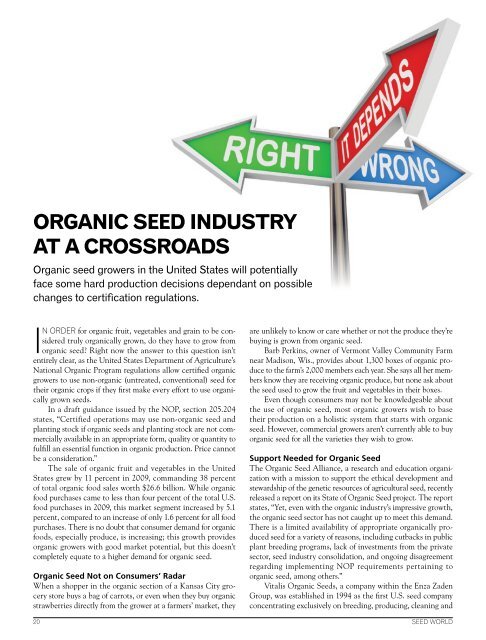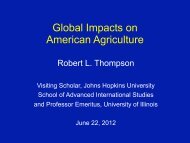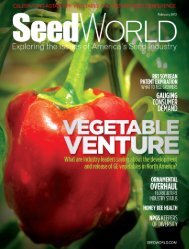organic seed industryat a crossroadsOrganic seed growers in the United States will potentiallyface some hard production decisions dependant on possiblechanges to certification regulations.In order for organic fruit, vegetables and grain to be consideredtruly organically grown, do they have to grow fromorganic seed? Right now the answer to this question isn’tentirely clear, as the United States Department of Agriculture’sNational Organic Program regulations allow certified organicgrowers to use non-organic (untreated, conventional) seed fortheir organic crops if they first make every effort to use organicallygrown seeds.In a draft guidance issued by the NOP, section 205.204states, “Certified operations may use non-organic seed andplanting stock if organic seeds and planting stock are not commerciallyavailable in an appropriate form, quality or quantity tofulfill an essential function in organic production. Price cannotbe a consideration.”The sale of organic fruit and vegetables in the UnitedStates grew by 11 percent in 2009, commanding 38 percentof total organic food sales worth $26.6 billion. While organicfood purchases came to less than four percent of the total U.S.food purchases in 2009, this market segment increased by 5.1percent, compared to an increase of only 1.6 percent for all foodpurchases. There is no doubt that consumer demand for organicfoods, especially produce, is increasing; this growth providesorganic growers with good market potential, but this doesn’tcompletely equate to a higher demand for organic seed.Organic <strong>Seed</strong> Not on Consumers’ RadarWhen a shopper in the organic section of a Kansas City grocerystore buys a bag of carrots, or even when they buy organicstrawberries directly from the grower at a farmers’ market, theyare unlikely to know or care whether or not the produce they’rebuying is grown from organic seed.Barb Perkins, owner of Vermont Valley Community Farmnear Madison, Wis., provides about 1,300 boxes of organic produceto the farm’s 2,000 members each year. She says all her membersknow they are receiving organic produce, but none ask aboutthe seed used to grow the fruit and vegetables in their boxes.Even though consumers may not be knowledgeable aboutthe use of organic seed, most organic growers wish to basetheir production on a holistic system that starts with organicseed. However, commercial growers aren’t currently able to buyorganic seed for all the varieties they wish to grow.Support Needed for Organic <strong>Seed</strong>The Organic <strong>Seed</strong> Alliance, a research and education organizationwith a mission to support the ethical development andstewardship of the genetic resources of agricultural seed, recentlyreleased a report on its State of Organic <strong>Seed</strong> project. The reportstates, “Yet, even with the organic industry’s impressive growth,the organic seed sector has not caught up to meet this demand.There is a limited availability of appropriate organically producedseed for a variety of reasons, including cutbacks in publicplant breeding programs, lack of investments from the privatesector, seed industry consolidation, and ongoing disagreementregarding implementing NOP requirements pertaining toorganic seed, among others.”Vitalis Organic <strong>Seed</strong>s, a company within the Enza ZadenGroup, was established in 1994 as the first U.S. seed companyconcentrating exclusively on breeding, producing, cleaning and20 <strong>Seed</strong> <strong>World</strong>
$14.95selling high-quality seed for organic farmers. Erica Renaud, businessdevelopment manager with Vitalis, agrees that there is alack of government support for organic breeding. “There is notthe same support for organic breeding in terms of infrastructure,”she says.As with all plant breeding using traditional methods ratherthan genetic modification, it takes breeders years to develop anew variety, then collect enough seed so it can be grown in commercialproduction. In addition to the time involved in breedingnew varieties, organic seed producers must abide by specificguidelines on organic growing methods. To make it worthwhilefor a company like Vitalis to invest time and money to produceorganic seed, there must be a pay-off. Renaud sees possiblechanges in NOP regulations, requiring organic growers to usean increasing percentage of organic seed each year, as being thecatalyst the U.S. seed industry needs to encourage more organicseed development.Tom Stearns, president of High Mowing Organic <strong>Seed</strong>s,agrees with Renaud’s assessment.“I am hoping the rules will change. I think that it will bevery beneficial to the overall organic seed industry to have a seedrule that is clearer,” he says. “It will help stimulate the industryto grow, which is a great thing for everyone.”Stearns founded his company, based in Hardwick, Vt., in1996 when he grew and marketed 28 varieties on his own. NowHigh Mowing <strong>Seed</strong>s offers home gardeners and commercialgrowers about 500 heirloom, open-pollinated and hybrid varietiesof vegetable, fruit, herb and flower seed. Stearns says about80 percent of seed sales are made to commercial organic growers.He is concerned that changes to the NOP regulationscould result in increased paperwork for organic growers whodon’t use organic seed because the varieties they wish to growaren’t available as organic seed. “The important issue is in thebalance—how is it implemented to serve growers rather thanbeing a burden on them,” he says.Barb Perkins and her husband, David, now use organic seedwhen they feel they can switch from conventional seed. “Everyyear we look at organic seed and see what is available. Does ithave all the qualities we want?” she says.<strong>Seed</strong> Must Offer Extra BenefitsThe higher cost of organic seed isn’t a deterrent for most fruitand vegetable growers, according to Stearns, because organicgrowers are able to extract a premium for their produce. Perkinsagrees, but adds they must be assured that organic seed holdsadditional benefits for them.Mark Overduin, president of Bejo <strong>Seed</strong>s Inc. in Oceano,Calif., a subsidiary of Holland’s Bejo Zaden, knows that organicgrowers are looking for extra characteristics in organic seed.“We do expect to provide additional benefits such as broaderadaptability, stronger overall immune systems, and more efficientroot systems with stronger nutrient uptake capabilities,” he says.The tipping point for organic seed—for seed growers andthose organic producers who use it—could come from thedevelopment of organic seed that can grow fruit and vegetablespossessing extra health benefits for consumers. For example,a new variety of red cabbage could contain a higher level ofantioxidants, making it nutritionally superior to other varieties.5 FactsEvery Grower Should Know about Sorghum1. Sorghum genetics are not the same as your father grew.2. Sorghums can produce as much or more yield as corn.3. Sorghums (BMR 6) can make more palatable and moredigestible high quality forage than corn silage.4. Sorghums grow with less input and less waterfor less cost than corn.5. Call us to learn about the new generationof SG sorghums for grain and forage.Advanta US1-800-333-9048www.AdvantaUS.comAdvanta US is an operating unit of Advanta, a global seed company.© 2011 Advanta US, Inc. SG (logo) is a registered trademark of Advanta US, Inc. D1724 SWSorghum for Forage Field GuideCall today for your copy of this 132-pagecomprehensive production guide.GrowingValueGreenin theSorghum for ForageField Guide800.333.9048october 1724_SW-horiz.indd 2011 18/17/11 2:36:18 PM21






